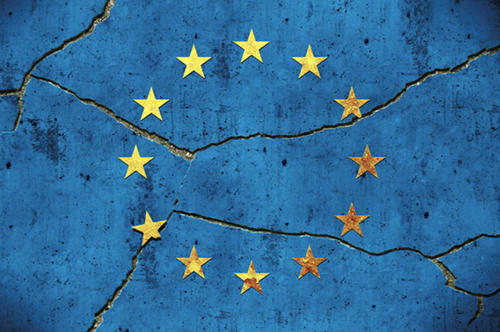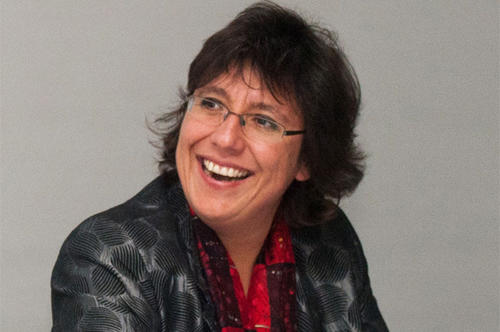“At the end of the crisis, the European Union will be more of a presence, not less”
Interview with political scientist Tanja Börzel, coordinator of the Jean Monnet Centre of Excellence at Freie Universität
Aug 13, 2012
The European Community is on shaky ground: What will its future look like?
Image Credit: Martin Wimmer / IStockphoto
Tanja A. Börzel is a professor of political science at Freie Universität Berlin.
Image Credit: Jean Monnet Centre of Excellence
“The EU and Its Citizens” is the title of the Jean Monnet Centre of Excellence at Freie Universität. The research institution, which is financed by the European Union, aims to gather the academic expertise on the EU present at the university in one place while also opening up the university’s research on EU-related topics to a broader public audience. An interview to mark the center’s final conference with its coordinator, Professor Tanja Börzel: on the research institution’s work and the current state of affairs in the European Union.
Professor Börzel, German President Joachim Gauck asked a good question: Do we need to explain the EU better to citizens?
It’s not that the German federal government doesn’t explain anything to the German people; various government explanations were provided. I think, though, that it doesn’t always respond fast enough. After the last EU summit, for example, Chancellor Angela Merkel left it to Italian Prime Minister Mario Monti and French President François Hollande to set the tone in the media. Merkel should have gotten up in front of the press herself right away after the summit in order to keep the compromise from being portrayed as a defeat for Germany – because it wasn’t. The resolutions represent a true compromise. This situation made German citizens feel more insecure. That’s unfortunate and unnecessary.
What does the Jean Monnet Centre of Excellence: The EU and Its Citizens work on?
The economist Philip Engler has developed a model for how the euro crisis can be managed in the short term. The political scientist Thomas Risse is studying the issue of identity and solidarity: Is there enough acceptance in Europe for the bailouts? After all, Germans aren’t the only ones who might have to pay. Greek, Spanish, and Italian citizens, and probably also the French, are being asked to shoulder massive cutbacks. The communication scholar Barbara Pfetsch is working on the topic of the European public sphere, and sociologist Jürgen Gerhards is studying multilingualism in the EU and the issue of whether Europe can afford to provide financial support for the languages of what will soon be 28 member states.
The European legal scholar Christian Calliess deals directly with EU citizenship. I myself study observance of rules within the EU, an area where a lack of compliance is seen by some as the cause of the current crisis. After all, it was Germany and France that first broke the rules set down in Maastricht, in 2005. In other words, if everyone had played by the rules we had imposed on ourselves, we might not be in a crisis now.
If the euro fails, will the EU fail with it?
First of all, I don’t think the euro is going to fail. In the worst case, individual countries will leave the eurozone. The political will at the moment, though, is to keep all of the countries using the euro. That means considering what might happen if the euro were to fail is a purely hypothetical exercise. We’ll get out of the crisis somehow or other. I would even argue that when it is over, the EU will be more of a presence, and not less.
How can the EU win back citizens’ approval – or did it never lose it?
It’s not that people feel that all they do is pay into the EU without ever getting anything back. I think the German people have a more nuanced view of the EU and what it does, and that it is clear to many that Germany has reaped and continues to reap huge benefits from the euro. For example, we have never had such low interest rates. In the last survey conducted by the research institute Infratest dimap, 58 percent of respondents also indicated that they supported the Chancellor’s European policy, which calls for aid subject to certain conditions. That means under the right circumstances, the German people are still willing to pay money if necessary. There is no evidence that there is general skepticism regarding the EU in Germany or Europe on the whole.
What do you think Europe will be like in 20 years?
If we can keep Spain from crashing and dragging Italy and France down with it, the crisis could be kept in check and overcome. To accomplish that, we have to address not only the debt and banking crisis, but also the growth crisis, meaning that we need to further stimulate the economy. The next step would then be to think about transferring further responsibilities to the European level.
It’s likely that not all member states would agree, and the existing variation in the levels of integration of individual countries into the EU would grow. If the currency union is joined by a real economic and fiscal union, the outcome would be that only some of the member states of the EU, perhaps the majority of the EU member states that now use the euro, would once again make a decisive step forward in terms of integration, and we would then truly have a Europe that moves along at two speeds – and in the EU’s core area: the economy.
Would that be good or bad?
We have already lived with the fact that ten of the 27 EU member states are not part of the eurozone anyway for some time now. At the same time, when they joined the European Union, the states also committed to join the euro. But they do have to meet convergence criteria in addition. The Swedes, for example, don’t want the euro, so they make sure that they don’t meet at least one of the convergence criteria.
In Central and Eastern Europe, too, enthusiasm for the euro hasn’t exactly grown. Some of these countries consider the ability to compete on the market through their currency as their major competitive advantage. And that’s well and good, since one of the euro’s big problems is that the countries are too different from each other. It was a mistake to include Greece, and it may also have been a mistake to include Spain and Italy. Now, though, it’s too late: We have to deal with things as they are.


